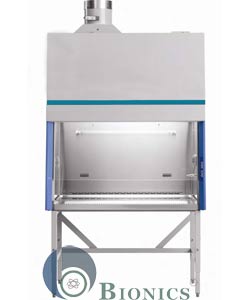The Must Know Details and Updates on Biosafety Cabinets
The Must Know Details and Updates on Biosafety Cabinets
Blog Article
Class 2 Biosafety Cabinets: Essential Equipment for Laboratory Safety and Microbiological Containment

Maintaining a safe lab environment is crucial in today’s advanced research and clinical setups. Whether it's conducting biological tests, diagnostics, or experiments with infectious agents, biosafety cabinets are central to preventing cross-contamination and safeguarding personnel.
Of all types, Class 2 cabinets are most commonly used due to their efficiency and versatility. These units are essential for labs working with infectious materials or clinical diagnostics.
Overview of Biosafety Cabinets in Laboratory Environments
Biosafety cabinets are airflow-controlled workspaces engineered for microbiological safety. They use high-efficiency filters to purify air entering and leaving the cabinet.
These units are generally classified into Classes I, II, and III depending on airflow and application needs. Among these, Class 2 cabinets are the most versatile and commonly used.
Why Class II Cabinets Are the Preferred Choice in Labs
Class 2 Biosafety Cabinets are designed to safeguard three aspects: the operator, the sample, and the environment. They direct filtered airflow in a laminar pattern over the work surface.
Both incoming and outgoing air are HEPA-filtered to maintain sterility and prevent leaks. These cabinets are frequently used in labs handling infectious agents or clinical samples.
What Makes Class 2 Cabinets Effective in Labs
A Class 2 microbiological safety cabinet includes several integrated safety mechanisms such as:
• HEPA/ULPA filtration to trap microbes and particles
• Uniform downward airflow to protect the sample zone
• Negative pressure barriers to prevent leakage
• Built-in UV sterilisation for decontaminating surfaces
• Quiet operation and ergonomic design for user comfort
• Clear front panel for visibility and safety
These elements create a clean, contained, and user-friendly workspace.
Where Class 2 Cabinets Are Used
Class 2 Biosafety Cabinets are key equipment in healthcare, molecular biology, and quality control. They are critical for DNA/RNA extraction, pathogen culture, microbiological safety cabinet and molecular assays.
From universities to private pathology labs, Class 2 cabinets ensure lab hygiene and sample integrity.
Why Laboratories Prefer Class II Safety Cabinets
Using Class 2 cabinets offers numerous benefits for safety, accuracy, and lab hygiene:
• Protects the integrity of lab work
• Prevents accidental exposure to infectious materials
• Ensures filtered air is safe for release or recirculation
These cabinets help labs meet safety regulations while maintaining workflow.
Cabinet Types and Global Compliance
Top manufacturers build Class 2 cabinets in accordance with strict international guidelines. Class 2 units are sub-classified as A1, A2, B1, and B2—with each type offering different air handling systems.
• Type A2: Ideal for general-purpose labs
• Type B2: Exhausts 100% of air via ducting; no recirculation
Selecting the right configuration ensures compliance and safety.
Tips for Purchasing the Ideal Biosafety Cabinet
Before purchasing, consider:
• The types of agents and materials handled
• Cabinet dimensions, ducting needs, and room layout
• Ease of use, energy efficiency, and upkeep
• Manufacturer reputation and post-sale support
Consulting with experts ensures the cabinet fits both budget and compliance goals.
Best Practices for Using Class II Biosafety Cabinets
For optimal results:
• Avoid placing near doors, vents, or fans
• Get periodic validation from certified technicians
• Train users in proper techniques and precautions
Operational best practices include:
• Use gloves, gowns, and face shields while operating
• Avoid sudden or quick arm movements
• Wipe work areas with disinfectants regularly
• Treat UV usage as an overnight sterilisation method
Why Class 2 Cabinets Are a Must-Have in Labs
Class 2 biosafety cabinets are a cornerstone of any safe, efficient laboratory. They safeguard both research outcomes and operator health.
From biotech and diagnostics to academia and pharma, Class II cabinets maintain sterility in sensitive procedures. When investing in a biosafety cabinet, choose performance and reliability over cost-cutting—because safe science starts with smart containment. Report this page